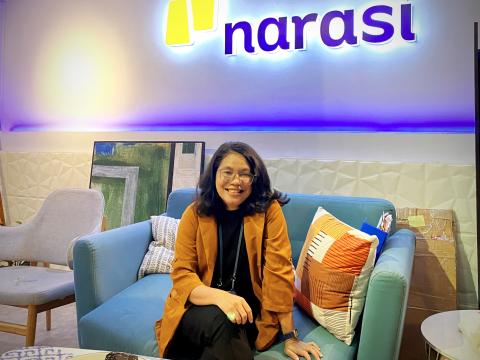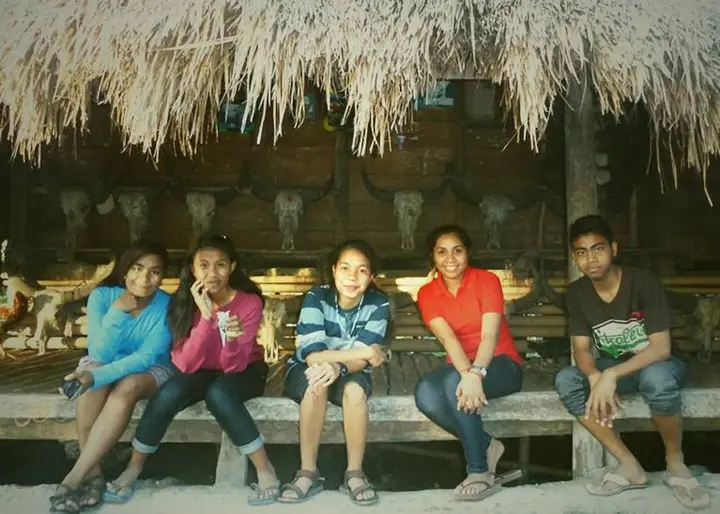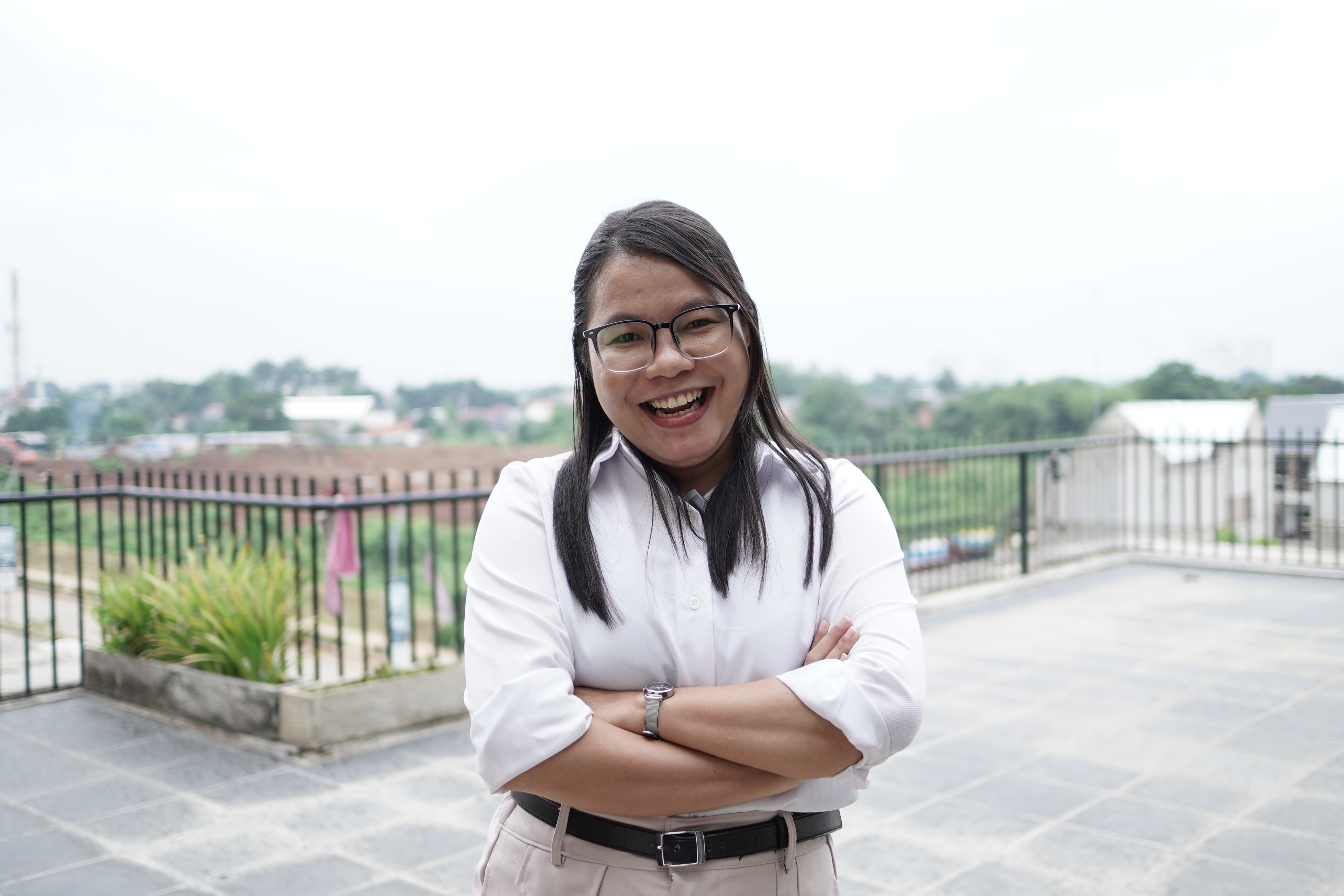Nana’s Story: How an Empowered Sumba Woman is Lifting Others

"In my village, I was the first girl to leave for higher education," says Maria Goreti, a 26-year-old from Sumba, as she begins to tell her story. Today, Maria, who goes by Nana, is a force for social good. She is the Head of Content and Communication for English Goes to Kampus (EGK), an organisation focused on education and child protection, as well as Karaja Sumba, which empowers weaver mothers. She also recently finished her work as a Co-Creator Development specialist at Narasi TV, a major media company.
Nana’s childhood was a classic Indonesian rural scene—a village in West Sumba Regency surrounded by hills, meadows, and rice fields. Like most people there, her parents worked as farmers. Ten years ago, electricity hadn’t yet reached her village. Children had to draw water just to bathe before school, and walked long distances to get there. "When I was in first and second grade, due to minimal classroom space, I had to study in what used to be a garbage dump," Nana recalls. Despite these challenges, she was able to overcome them with the support of her family and an organisation called Wahana Visi Indonesia (WVI).
From 1999 to 2014, WVI ran a community development program in West Sumba. Nana was one of the children sponsored by the program. In addition to limited services and facilities, children in West Sumba also faced issues of protection and gender inequality. "Thankfully, amidst the limitations, there were WVI sisters who accompanied me in the Children's Forum. That's also what led me to get to know the outside world, both through the screen and through activities facilitated by WVI," she says.

A Girl Free to Flourish
As Nana grew up, she faced the patriarchal culture of West Sumba. As the youngest daughter, she was expected to help her mother with the house and garden, not to pursue a career. "Don't even dream of going to high school or having the opportunity to work in the public sphere," she was often told. This mindset led many of her female peers to give up their education for early marriage or to work as migrant labourers.
Economic and cultural pressures often pushed girls in West Sumba into being a shortcut to quick money. Women’s empowerment was seen as a luxury, an investment that was too slow to pay off. "Parents feel that if there's no money for school, then they should get married so they can get a dowry. Or, just work to boost the family economy. Girls are most often the ones sacrificed," Nana explains.
This cycle often led to violence against women. Girls who dropped out of school and married young often lacked financial stability. They were forced to bear the double burden of working and mothering, with the only available jobs often being as female migrant workers. They would have to leave their children behind with little to no care. "Thankfully, if their husbands still want to take care of their children. But if they're entrusted to family members who don't pay attention to children’s rights, the problems become even more complex," Nana says.
This reality motivated Nana to participate in the WVI-facilitated Children's Forum actively and to commit to continuing her education at university. She also wanted to make the most of the freedom her parents gave her to participate and grow. "One thing I remember most from my father, when he went anywhere, if he found old magazines or books that people threw away, he would take them and bring them home for me to read," she recalls. "My parents felt that, even though they didn't go to school, they would give me space to keep learning as much as possible."
Nana grew up differently from most girls in her village. She actively participated in school and community activities, became a voracious reader, and made her parents proud with a series of academic and non-academic achievements. "My father and mother always advised, as long as the school and other activities I participate in are good, and I don't harm other people, they would support me in their own way," she says. "Even if it's as simple as being a defensive wall when people give negative comments about my activities."
Through a scholarship, Nana successfully earned her Bachelor’s degree from the Faculty of Communication Studies at Nusa Cendana University in Kupang. Her excellent academic record, her experience with the Children's Forum, and her parents' unwavering support became her portfolio, propelling her forward. The skills she learned in the Children's Forum, like having the confidence to express her ideas and being familiar with research, were invaluable in college.

A Young Woman with a Humanitarian Calling
"My job at Narasi wasn't something instant. It's the result of a process I've been through since I was involved in the Children's Forum," Nana says. "Even though I was just a little girl from a village that had no signal or electricity, I can now work in the media in Jakarta. This dream come true is something I am very grateful for. Now I am sure that my humanitarian calling is through the profession I pursue."
Nana's career began when she took part in a basic writing and journalism training facilitated by WVI. "That's what actually formed the seed for me to live out my calling as a media worker," she says. As she progressed, she realised her profession was a way to channel her anxieties, a platform for criticising policies that hurt vulnerable groups, and a way to connect with people from all walks of life.
"When I was in the Children's Forum, I voiced children's and women's issues in children's language," she says. "But as I learned more and met various people who had concerns about similar issues, my alignment with the issues that WVI had worked on with me from 2005 to 2014 became sharper."
Of the many transformations she experienced, Nana says one of the most valuable was her understanding of children's rights. Before WVI came to her village, she didn't know that every child had rights that should be recognised and fulfilled by adults and the state. "I had a new perspective; it turns out the application of children's rights is not as complex as what is discussed in the law," she explains.
For Nana, children’s rights were simple but meaningful. While with WVI, her rights as a child were recognised by being allowed to choose a roommate during activities, pick a food menu during training, or set the dos and don'ts during sessions. "These things made me really feel what is called meaningful participation. This asset of knowledge is the most valuable for me and has carried over into my life now."
Today, Nana is an inspiration to other girls. She believes that every person, especially women and other vulnerable groups, has potential waiting to be discovered. She encourages others to explore by building networks and socialising with communities that match their interests.
"Don't feel small and afraid, but take advantage of all the resources you have. Believe it, the little things we do every day are what will bring us closer to our dreams,” Nana concluded.
Article written by Mariana Kurniawati, Wahana Visi Indonesia Communication Executive